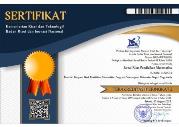PERBANDINGAN KEEFEKTIFAN ANTARA PROBLEM-BASED LEARNING SETTING NUMBERED HEAD TOGETHER DAN SETTING JIGSAW
DOI:
https://doi.org/10.21831/jrpm.v2i1.7151Keywords:
problem-based learning, numbered head together, jigsaw, prestasi belajar matematika, kemampuan berpikir kritis, disposisi matematisAbstract
Penelitian ini bertujuan untuk mendeskripsikan: (1) keefektifan problem-based learning dengan setting model pembelajaran kooperatif tipe Numbered Head Together (PBL-NHT) dan problem-based learning dengan setting model pembelajaran kooperatif tipe jigsaw; dan (2) pembelajaran yang lebih efektif antara PBL-NHT dan PBL-Jigsaw ditinjau dari prestasi belajar matematika, kemampuan berpikir kritis, dan disposisi matematis siswa kelas X SMA. Penelitian ini merupakan penelitian eksperimen semu (quasi eksperimen), yang menggunakan rancangan pretest-postest non-equivalen multiple-group design. Instrumen yang digunakan adalah tes prestasi belajar matematika, tes kemampuan berpikir kritis, dan angket disposisi matematis. Data dianalisis menggunakan uji multivariat (MANOVA) dan independent sample t-test. Hasil penelitian menunjukkan bahwa kedua model pembelajaran ini efektif ditinjau dari kemampuan berpikir kritis dan disposisi matematis, tetapi tidak efektif ditinjau dari prestasi belajar matematika. PBL-Jigsaw lebih efektif dibandingkan PBL-NHT ditinjau dari disposisi matematis, tetapi tidak berbeda jika ditinjau dari kemampuan berpikir kritis matematis dan prestasi belajar matematika.
Kata Kunci: problem-based learning, numbered head together, jigsaw, prestasi belajar matematika, kemampuan berpikir kritis, disposisi matematis
THE COMPARISON OF THE EFFECTIVENESS OF PROBLEM-BASED LEARNING OF NUMBERED HEAD TOGETHER AND THAT OF THE JIGSAW
Abstract
This study aims to describe: (1) the effectiveness of problem-based learning of the numbered head together (PBL-NHT) type and that of jigsaw (PBL-Jigsaw) type, and (2) the more effective teaching between PBL-NHT and PBL-Jigsaw in terms of learning achievement, critical thinking skills, and mathematics dispositions of class X students. This study was a quasi-experiment using a pretest-posttest with the non-equivalent multiple-group design. The instruments used were a math achievement test, critical thinking test, and mathematics disposition questionnaire. The data were analyzed using the multivariate (MANOVA) and independent sample t test. The results of this study show both the models are effective in terms of critical thinking skills and mathematics dispositions, but they are not effective in their learning achievement. The PBL-Jigsaw is more effective than PBL-NHT in mathematics dispositions, but does not differ in terms of the critical thinking skills and learning achievement.
Keywords: problem-based learning, numbered head together, jigsaw, learning achievement, critical thinking skills, mathematics dispositionsReferences
Arends, R. I. (2012). Learning to teach. (9th ed.). New York: McGraw-Hill.
Azwar, Saifuddin. (2002). Tes prestasi: fungsi dan pengembangan pengukuran prestasi belajar. Yogyakarta: Pustaka Pelajar Offset.
Bawn, S. (2007). The effects of cooperative learning on learning and engagement. Tesis master, tidak dipublikasikan, The Evergreen State College, Olympia, Washington.
Beyers, J. (2011). Development and evaluation of an instrument to assess prospective teachers' dispositions with respect to mathematics. International Journal of Business and Social Science, 2, No. 16; 20-32.
Delisle, R. (1997). How to use problem-based learning in the classroom. Alexandria: Association for Supervision and Curriculum Development.
Duch, B. J., Groh, S. E., & Allen, D. E. (2001). The power of problem based learning. Sterling: Stylus.
Griffin, P., McGaw, B., & Care, E. (Eds.). (2012). Assessment and teaching of 21st skills. New York: Springer Publishing Company.
Jacob, S. M. 2012. Mathematical achievement and critical thinking skills in asynchronous discussion forums. Journal of World Conference on Learning, Teaching & Administration, 31, 800-804.
Jacobson, Eggen & Kauchak. (2009). Methods for Teaching. Boston: Pearson.
Jansen, A. (2012). Developing productive dispositions during small-group work in two sixth-grade mathematics classrooms (Teachers' facilitation effort and students' self-reported benefits. Middle Grades Research Journal, 7, No. 1, 37-56.
Kanik, F. (2010). An assessment of teacher's conceptions of critical thinking and practices of critical thinking development at seventh grade level. Disertasi, tidak dipublikasikan, Middle East Technical University, Turki.
Kilpatrick, J., Swafford, J., & Brandel, B. (2001). Adding it up: helping children learn mathematics. Washington DC: National Academy Press.
Lai, E.R. (2011). Critical thinking: a literature review. Research report of Pearson. Diambil pada tanggal 18 Juli 2013 dari http://www.pearsonassessments.com
Levin, B. B. (2001). Energizing teacher education and national development with problem-based learning. Alexandria: Association Supervision and Curriculum Development.
Lie, Anita. (2010). Mempraktikkan cooperative learning di ruang-ruang kelas. Jakarta: Grasindo
McGregor, D. (2007). Developing thinking developing learning. Buckingham: Open University Press.
National Council of Teachers of Mathematics (NCTM) (1989). Curriculum and evaluation standards for school mathematics. Reston, Virginia: The National Council of Teachers of Mathematics.
Organisation for Economic Cooperation and Development. (2004). Learning for tomorrow's world: first results from pisa 2003. Paris: OECD. Diakses dari http: //www.oecd.org/education/ school/programmeforinternational studentassessmentpisa/34002216.pdf, pada tanggal 8 Juli 2013.
Pacific Policy Research Center. (2010). 21st Century skills for students and teachers. Honolulu: Kamehameha Schools, Research & Evaluation Division. Diakses dari http: //www.ksbe.edu/spi/PDFS/21%20century %20skills%20full.pdf, pada tanggal 22 Juni 2013.
Slavin, R. E. (2009). Cooperative learning: teori, riset dan praktik. (Terjemahan Lita ). Bandung: Penerbit Nusa Media.
Stacey, K. (2013). Learning from PISA. Makalah disajikan dalam Konferensi Nasional Pendidikan Matematika V, di Universitas Negeri Malang.
Tan, O. S. (2003). Problem-based learning innovation: using problems to power learning in the 21st century. Singapore: Cengange Leaning.
Tan, O. S. (2004). Enhancing thinking through problem-based learning approaches: international perspectives. Singapore: Cengange Leaning
Downloads
Published
How to Cite
Issue
Section
License

Jurnal Riset Pendidikan Matematika by http://journal.uny.ac.id/index.php/jrpm/index is licensed under a Creative Commons Attribution-ShareAlike 4.0 International License.









